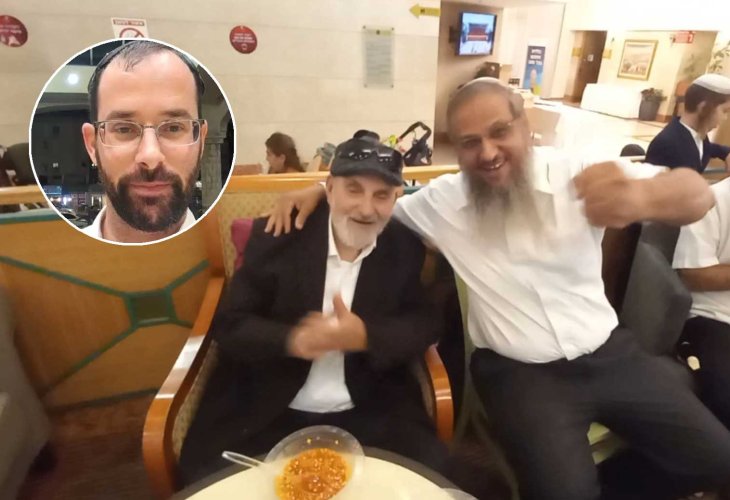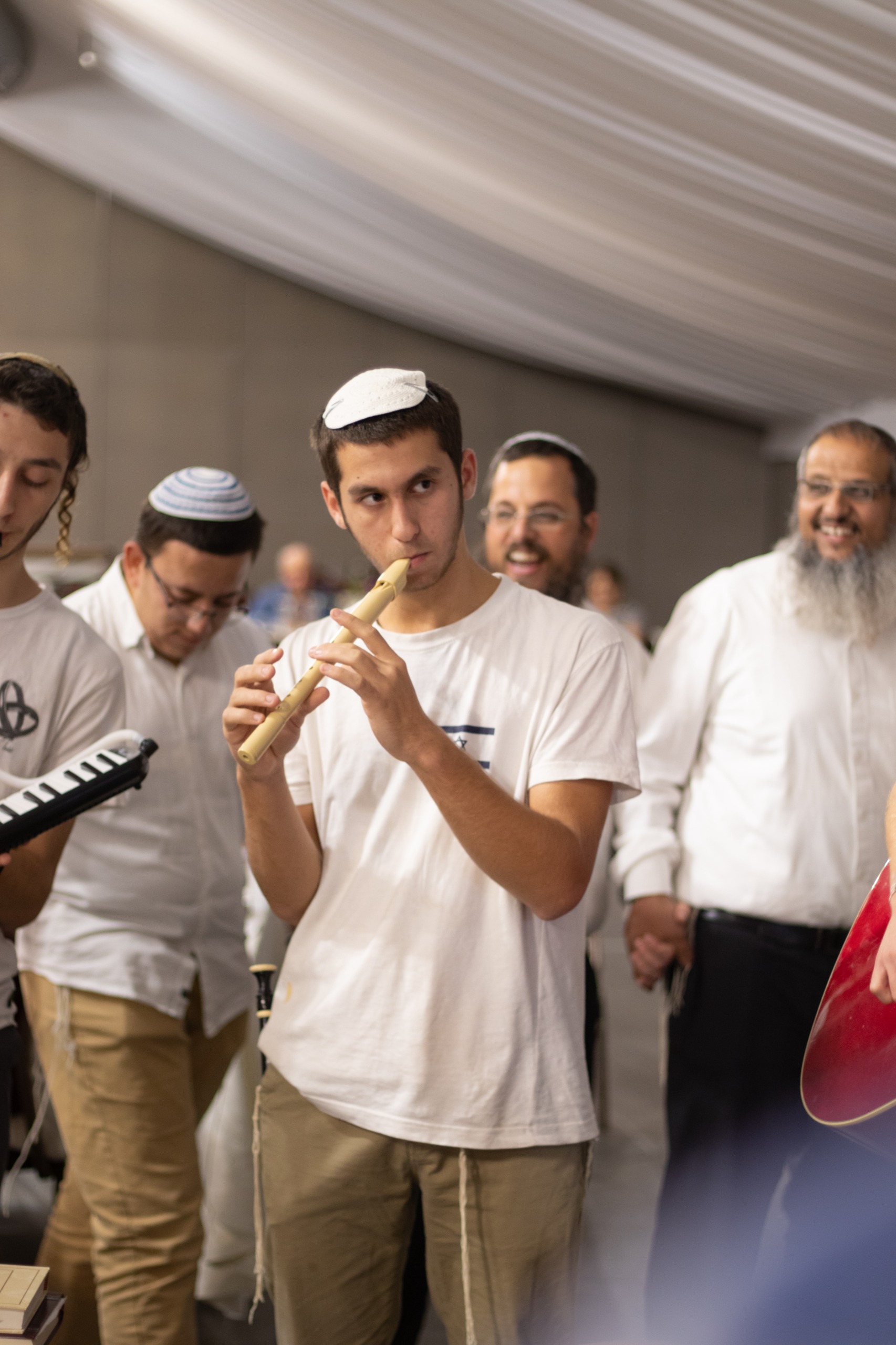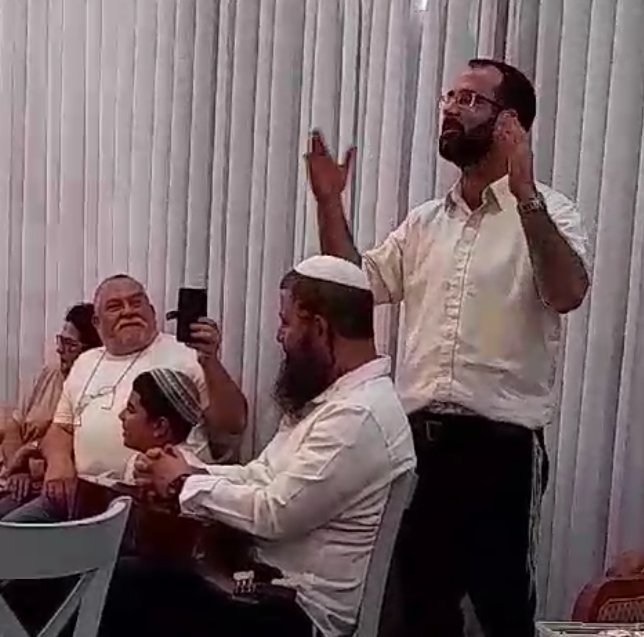"I Was Here 18 Years Ago, and Now I Return to Tell You: 'Am Yisrael Chai'"
18 years ago, Eitan Alpert was evacuated from Gush Katif to the Plaza Hotel in Nof HaGalil. Last week, Rabbi Asaf Azriel, rabbi of Shatula village, was evacuated with his entire community to the same hotel. They meet now for an emotional reunion, confident: "They won't break us."
 In the circle: Eitan Alpert, Rabbi Azriel (Rabbi of Shatula) on the right
In the circle: Eitan Alpert, Rabbi Azriel (Rabbi of Shatula) on the rightAbout 18 years ago, Eitan Alpert, then a young student and father to a newborn, found himself being evacuated along with thousands of Gush Katif residents from the settlement he dearly loved. The 'Torat Chaim' Yeshiva community to which Alpert belonged was housed by the state in the Plaza Hotel in Nof HaGalil, where they stayed for about a month before moving to another hotel.
This week, memories resurfaced as Alpert, now living in Nof HaGalil and part of the religious core group, came with his group to comfort the Shatula evacuees now staying in the very same hotel. "Everything flooded back," he shares, "I came with friends to strengthen and cheer people up, and suddenly I was in shock, feeling the same emotions from back then, the uncertainty, the immense pain, yet also the strong, clear faith that things will get better and that Hashem will not abandon us."
Unforgettable Memories
Alpert remembers the expulsion days from Gush Katif down to the last detail. "I was a student in the yeshiva, and none of us believed the evacuation would truly happen. My wife was just about to give birth, and it was still clear to us we would raise our son in Gush Katif. We believed this until the last moment, so we didn't prepare at all. Eventually, we were evacuated with a days-old baby, together with the entire community. We were forcibly disconnected and housed right in this hotel. I remember sitting in the lobby without even basic equipment, as no one allowed themselves to prepare and pack. Initially, there were no frameworks for the children or plans for the future, only indescribable pain and many necessities sent to us by the kind-hearted from the area - sweets, clothes, gifts, and more. It didn't really improve our situation, but it certainly encouraged and gave us strength, especially the great faith in the Creator of the Universe sustaining us all the time. The understanding that He alone manages the world, and that as long as He watches over us, no harm can come to us. This is also what I reiterate to the Shatula residents when I come to encourage them - we must believe and know that we have no one to lean on but Avinu Malkenu."

"Our situation is not simple at all," shares Shatula's Rabbi, Rabbi Asaf Azriel, "Our village is very old, settled mainly by calm, diligent, and pleasant people from the Kurdish community. For the past 16 years, a religious core has joined the village, comprised of relatively young families. Overall, a very diverse community was formed in the village, with families of all ages and a special atmosphere of respect and inclusiveness for all residents. We have a synagogue, Torah classes, and events around all the holidays attended by both religious and non-religious people all through mutual and healthy dialogue."
As of these days, Rabbi Azriel notes that about 80 families from the village have been housed in the Plaza Hotel in Nof HaGalil, leaving the village almost entirely empty. "Only a few people remain," he reports, "as well as soldiers and emergency responders. Initially, some residents tried to resist and stay, but we all quickly realized the situation threatened life itself. Just this week, an announcement from the IDF spokesperson declared the area threatened, which I fully understand, having been there last week during one of the bombardments. It feels like being in a warzone; you have no siren to take cover, because the moment the bomb is thrown, it lands. Our soldiers are fighting fiercely there, under open fire, and we continuously pray for them, that Hashem will keep and protect them all."
"Creating a Positive Reality"
Have you been told how long these evacuations will last?
"We haven't been told anything," Rabbi Azriel responds, "and everyone senses tremendous uncertainty. This is the greatest challenge because ultimately, people want to return to their homes and resume routine. This naturally joins the tough feeling following everything occurring in the south and center of the country. It's hard to be optimistic these days.
"Meanwhile, we are here, understanding that this is our mission," he adds, "the aspiration is to try to create some sort of routine - with prayers, activities for the children, and strengthening events coming from the religious core and the hesder yeshiva in Nof HaGalil. Volunteers coming here give us a great deal of strength, it's not just spiritual encouragement, but they genuinely cheer and uplift us. I see firsthand how, thanks to them, people from the village who were always worried and found it very hard, finally manage to divert their attention from the situation and create a positive reality."
"We will continue coming here throughout," promises Eitan Alpert, "because it's clear to us this is the only way to keep our spirit and sanity intact. We strive to encourage, and of course, also pray together with all of Am Yisrael, that all evacuees will soon be able to return to their homes with full tranquility."

Speaking as someone evacuated from Gush Katif, he adds: "It's clear the state committed a grave wrong against the evacuees, and now we all bear the heavy price, but I must say the yeshiva community we belonged to in Gush Katif never dissolved, now located intact in Yad Binyamin, with another branch associated with the yeshiva in Nof HaGalil. Personally, I now have nine children *bli ayin hara*, and we strive to bring joy as much as possible and offer our contribution to Am Yisrael, because there is no doubt that even in difficult times, one can see the light, and there's always hope and revival."

